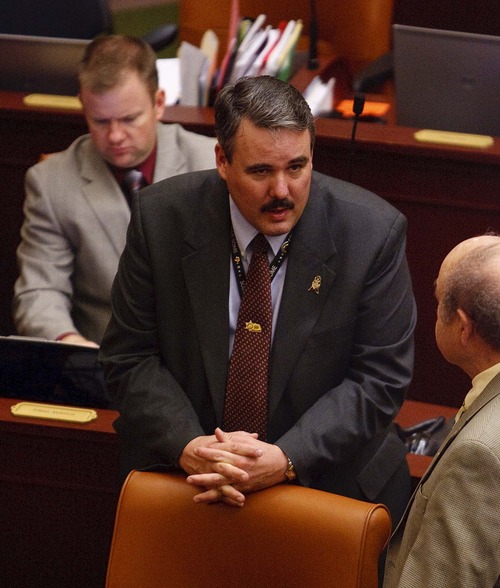This is an archived article that was published on sltrib.com in 2013, and information in the article may be outdated. It is provided only for personal research purposes and may not be reprinted.
Drivers younger than 18 will be prohibited from talking on their cellphones while they're behind the wheel, under legislation that Gov. Gary Herbert has signed.
"Teen drivers don't need anything else to distract them. They have enough on their own, just learning the process," said Rep. Lee Perry, R-Perry, a Utah Highway Patrol trooper and sponsor of HB103.
Perry said he hopes that teen-age drivers who learn not to talk on their phone would continue that habit into adulthood, and there ultimately will be fewer drivers talking on the phone when they drive.
"I'm not throwing the teens under the bus more than anybody else," when it comes to cellphone use, Perry said. "Teens just haven't had the experience of driving, so this is just one more distraction they don't need."
The legislation takes effect May 14.
The bill had been sponsored the past several years by then-Sen. Ross Romero, D-Salt Lake City, but failed to pass. Perry's bill was almost identical — although it would assess a $25 fine for violations instead of a $50 fine — and nearly met the same fate in the Senate.
It was voted down because several supportive senators weren't on hand for the vote, but it was later revived and passed.
Opponents argued at the time that the bill would be difficult for police to enforce and that it represented excessive government regulation.
Wednesday marked the final day for Herbert to sign bills. All told, Herbert signed 501 bills and vetoed one — HB76, which would have allowed any adult without a criminal record to carry a concealed gun without having to first get a state-issued concealed firearms permit.
Among the final four bills Herbert signed Wednesday was HB391, sponsored by Rep. Jake Anderegg, R-Lehi, which originally would have prevented Utah from expanding Medicaid as part of the Affordable Care Act.
Under the provisions of the act, also known as Obamacare, the federal government would pay all the cost in the first three years to cover an estimated 130,000 low-income Utahns, with the state picking up more of the tab over time, up to 10 percent in 2021 and beyond.
Anderegg argued the program was unaffordable and sought to block the expansion. But the bill was watered down, requiring reports to the Legislature on the costs and benefits of expansion and other elements of the plan.
The governor also signed HB155, sponsored by Rep. Mike Noel, R-Kanab, which will prohibit certain federal employees — specifically Bureau of Land Management officers or those Forest Service officers who are not trained law enforcement — from enforcing Utah laws.
If they do, those federal employees could be charged with impersonating a peace officer, a class B misdemeanor, punishable by up to six months in jail and a $1,000 fine.
Herbert also signed SB86, sponsored by Sen. John Valentine, R-Orem, creating an ethics commission to police the conduct of the governor, lieutenant governor, attorney general, auditor and treasurer.
The absence of such a commission came to light amid allegations that Attorney General John Swallow may have acted unethically in helping St. George businessman Jeremy Johnson during an investigation by the Federal Trade Commission.
The ethics commission, modeled after a similar panel created for the Legislature, would not be retroactive.



